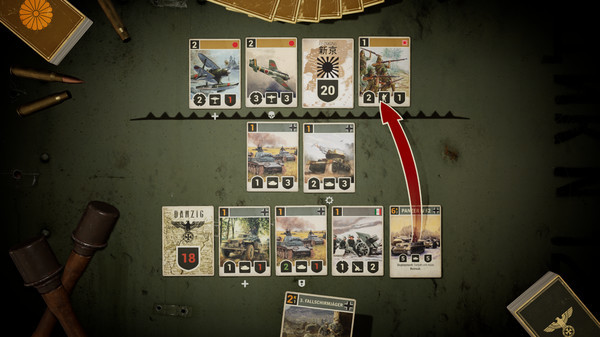After a year of first access, the definitive version of the Cards has finally arrived, a World War II trading card game available on Steam for PC. The title was built for the 1939 Games, and is taken from the formula by other GCCs such as Hearthstone in games 1 vs 1. Strategy, mental warfare and opportunity are everything, but in military style.
Kards we can choose from five playable teams: the USA, Germany, the Soviet Union, Japan and the United Kingdom. Each country has its own cards, and depending on the group chosen, played in one style or another (for example, Germany has good attacking cards, but falters in defense). When we start this game, we have to defeat this and the other teams to open their starting position, so that we can always play with the army we want. Later, it could also fight France and Italy.
The goal in Kards is simple: lift your world to glory through various battles where you get points to unlock better cards. We can both play against AI and PvP mode against other players, which is a real challenge for the Cards. In this case there is a division o ladder where the goal is to stay as high as possible. Earnings earned (coins) are used to purchase more store cards, which is a consolidation strategy.
But here, as with any card game, the combat system (battle 1 vs 1) is very important. It's worth pointing out something really good about the Cards, and that that's a pretty easy game to understand for players playing the CCG type. Also, it makes sense, as new cards are unlocked, improved results also appear, so the difficulty increases. But no one will have a problem understanding how the Cards work, the fact that, especially in card games, they often put rookies behind.
The Cardinals' game plan is based on a 40-card deck of both opponents. Each player has bets with large life points at the beginning. The goal, of course, is to leave the opponent's life to 0. Each time, initially, the user has to draw the card. There are three battlefields, one with each player and the front (center), being like a real battle. Cards have the cost of entering the game and taking action (attacks), while each player has a credit limit to spend on each round, which is equal to the mana cost.
Basically, in each round the cards can be forwarded to later attack other cards or player's life points. A maximum of five cards can be pre-set. Also, each card has very simple stats (attack and defense). It's a system like Magic Cards, for example, but it's simple, with the words that in order for cards to attack they must start their chance to move forward.
Of course, not all cards are the same type, and they don't use all of the attacks or defenses. There are different style cards (earth, air, battle), each with unique characteristics that make it unique. For example, there are spirit cards that can directly attack a player or other cards without taking advantage of their ability to advance to the front of the attack. There are also cards, which seem to be backups, which have the function of increasing or decreasing your card or opponent's attributes, and are destroyed instantly.
We have to highlight the good composition of the Cards, one of the game's main strengths. These characters not only have a magnificent and well-preserved drawing, but each one represents real armies, weapons or vehicles, and a detailed description to be able to read and learn, something one would definitely want to know. In addition, the games have a military setting, military-style music and sound when attacking or defending, which mimics the battle well.
However, the Cardinals not only attract their gameplay, but the collectors' side also shines. Each team has 92 cards (Italy and France only 20), so the game has over 500 cards. Unlocking them all is a milestone, and adds that, with updates, they will be using more. As with other style games, card packs can be purchased, so there are small payments in this game that can help you speed up your process (although cards can come out random).
In general, from what we've been able to prove in battles, the gameplay is pretty straightforward and the ribs are often at odds with players of the same level (and card strength), so it's not too unnatural when comparing investors and non-players. You can upgrade and unlock more cards by working, completing daily missions and winning games.
In addition to the battles and general divisions, there is a so-called "draft" mode that is really fun, where the techniques and ability to properly build a booth are all. In the setting you have a series of cards to choose from and build a channel from, so grace to choose the best one to get the best consistency. Draft is a great way to be able to play so many games for those who can't count all the cards in the game.
It should be added that, one of the best work of the Cards, the great opportunities a player has when it comes to building his own space. The desk is made not only with party cards, but where & # 39; design & # 39; allowed to enter 12 cards from another country (affiliate group). This opens up a lot of doors for strategic planning, as each team has its strengths and weaknesses, so with the cards included you can compensate us for what we think we have.
As a renewable feature, the Kards can offer many incentives for the player to work every day, whether through travel, rewards, or small competitions. Other game mode is also lost, with all the opportunities provided by the game of historical soldiers, because the current ones (training, war and preparation) are short, though it is true that the game has just come out and has a lot of room for improvement.
In short, Kards is an excellent game for card type lovers, but also for those who want to get started and try out the experience. The title has a long journey to continue developing, using cards and improving the game system, so that at the same time it becomes an important part of the genre. In addition, its mobile jump is slated for 2020, so it will also expand its gaming base.
Last year the 2019 World Cup was played, despite the fact that the game was not yet officially released, as you can see here. You have time to give it a try and become an outstanding military minded, great luck in your battle.
window.fbAsyncInit = function() { FB.init({ appId : '108566389241293', channelURL : '//www.google.com/fbchannel.php', status : true, cookie : true, xfbml : true, oauth : true, version : 'v2.7' });
if (typeof(postReview) == "function") postReview();
FB.Event.subscribe('edge.create', function(targetUrl) { _gaq.push(('_trackSocial', 'Facebook', 'Like', targetUrl)); }); FB.Event.subscribe('edge.remove', function(targetUrl) { _gaq.push(('_trackSocial', 'Facebook', 'Unlike', targetUrl)); }); FB.Event.subscribe('message.send', function(targetUrl) { _gaq.push(('_trackSocial', 'Facebook', 'Send', targetUrl)); }); };
// document.addEventListener("DOMContentLoaded", function(){ // DrawFacebookLikeNotification(); // });
function FastRegister(tournament=false){ ajaxAgreementsPopUp(); if (typeof isSmartphoneLayout != 'undefined' && isSmartphoneLayout) window.location='/join'; else { $.ajax({ type: "POST", url: "/ajaxstuff/fastRegister.php", data: {session: {"screated":1588693570,"updated":1588693570},tournament:tournament}
}) .done(function (code) { $('#re_loginbox').replaceWith(code); // console.log(code); $('.loginWrapper').show(); }) .fail(function(jqXHR, msg) { console.log("request fail"); $(selectorForLoginMessage).text(msg).show(); }); } return false; }
function FastRegisterResponse(){ $.ajax({ type: "POST", url: "/ajaxstuff/fastRegister.php",
}) .done(function (code) { $('#re_loginbox').replaceWith(code); // console.log(code); $('.loginWrapper').show(); }) .fail(function(jqXHR, msg) { console.log("request fail"); $(selectorForLoginMessage).text(msg).show(); }); return false; }
function LoginWithFacebook(selectorForLoginMessage, fbUpdateUser) {
FB.login(function(response) { if (response.authResponse) { FB.api('/me', {fields: 'email,last_name,name,first_name'}, function(user) { var main = false; if (user && !user.error) { // console.log(user); if(selectorForLoginMessage == '#fbLoginMessageMain') main = true; $.ajax({ type: "POST", url: "/ajaxstuff/fblogin.php", data: {userobj: user, fbUpdateUser: fbUpdateUser, main: main} }) .done(function(code) { if(main){ console.log("Is logged"+code); if(code==0) { if(!$('.signin').hasClass('active-signin')) { $('.signin').addClass('active-signin'); if($('.login').hasClass('active-login')) { $('.login').removeClass('active-login'); var request = new GRAsync(); var path = '/ajaxstuff/join.php?ajaxRequest'; request.setUrl(path) .setSelectors($('#joinContainer') ) .setData({register:true,facebookUser:user}) .setDataType('html') .setType('POST') .sendRequest();
} } } else { window.location="/";
} } else{ $('#re_loginbox').replaceWith(code); $('.loginWrapper').show(); //location.reload(true); } }) .fail(function(jqXHR, msg) { console.log("request fail"); $(selectorForLoginMessage).text(msg).show(); });
} }); } else { // console.log('User cancelled login or did not fully authorize.'); } }, {scope: 'email,publish_actions'}); // TODO: don't ask for publish_actions by default. It might scare away some users. Ask later, when they actually want it. return false; }
function AddSearchParamsAndReload(newParamStr) {
var newParamArr = newParamStr.split("&");
if (window.location.search.length > 1) { // don't count the initial '?'
var oldParams = window.location.search.substr(1).split("&");
var paramsToAdd = ();
for (var j = 0; j < newParamArr.length; j++) {
var found = false;
for (var i = 0; i < oldParams.length; i++)
if (newParamArr(j) == oldParams(i))
found = true;
if (!found)
paramsToAdd.push(newParamArr(j));
}
if (!paramsToAdd.length)
window.location.reload();
else
window.location.search += '&'+paramsToAdd.join("&");
}
else
window.location.search = '?'+newParamStr;
}












